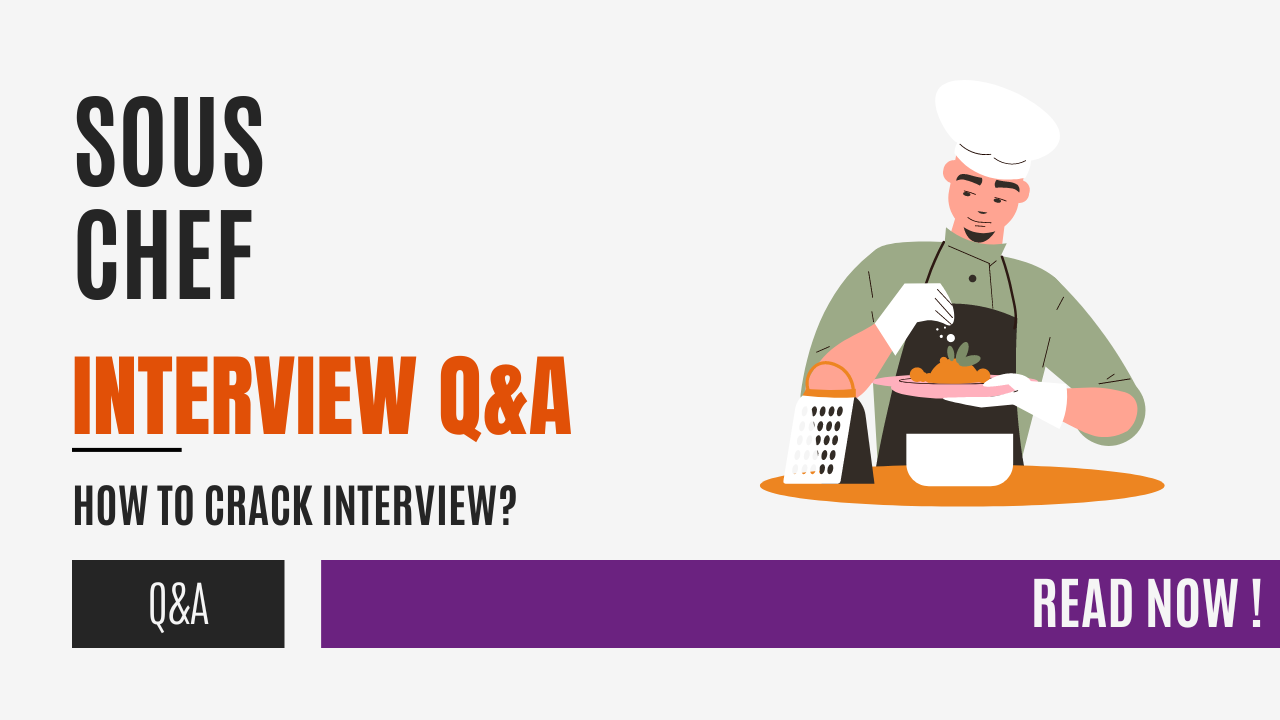Blog Detail

How to Prepare for Junior Sous Chef Interview in Malaysia
May 25, 2024
Introduction:
Entering the culinary world as a Junior Sous Chef is an exciting prospect for many aspiring chefs. It's a role that demands skill, creativity, and a deep passion for food. However, landing a position as a Junior Sous Chef requires more than just culinary talent; it requires preparation, confidence, and an understanding of what interviewers are looking for. In Malaysia, where the culinary scene is vibrant and diverse, the competition can be fierce. Therefore, mastering the art of the Junior Sous Chef interview is essential. In this comprehensive guide, we'll explore everything you need to know to ace your Junior Sous Chef interview in Malaysia.
Understanding the Role of a Junior Sous Chef:
Before diving into interview preparation, it's crucial to understand the role of a Junior Sous Chef. A Junior Sous Chef is a vital member of the kitchen brigade, assisting the Sous Chef and Executive Chef in managing kitchen operations. Responsibilities may include menu planning, ingredient sourcing, supervising kitchen staff, ensuring food quality and consistency, and maintaining kitchen hygiene standards. In Malaysia, where culinary traditions blend with modern techniques, Junior Sous Chefs are expected to be versatile, adaptable, and innovative.
Researching the Employer:
One of the most critical steps in interview preparation is researching the potential employer. Take the time to learn about the restaurant or hotel where you're applying for a Junior Sous Chef position. Understand their cuisine style, menu offerings, target clientele, and reputation within the culinary industry. Familiarize yourself with their ethos, values, and any recent accolades or achievements. This knowledge will not only demonstrate your genuine interest in the position but also help you tailor your responses during the interview to align with the employer's expectations and goals.
Preparing Your Culinary Portfolio:
A strong culinary portfolio is a valuable asset during a Junior Sous Chef interview. Compile a comprehensive portfolio showcasing your culinary skills, experiences, and achievements. Include photographs of dishes you've prepared, menus you've designed, and any culinary competitions or events you've participated in. Highlight your creativity, attention to detail, and ability to work under pressure. Additionally, consider including any certifications, awards, or endorsements relevant to the culinary field. Your portfolio should serve as a visual representation of your capabilities and passion for cooking.
Practicing Common Interview Questions:
While every interview is unique, there are common questions that Junior Sous Chef candidates can expect during the interview process. Practice responding to questions about your culinary background, specific cooking techniques, leadership style, and approach to menu development. Be prepared to discuss challenges you've faced in previous roles and how you've overcome them. Emphasize your ability to work collaboratively in a team environment, communicate effectively, and maintain high standards of food quality and presentation. Additionally, be ready to showcase your knowledge of Malaysian cuisine and your willingness to incorporate local ingredients and flavors into your cooking.
Demonstrating Your Skills:
In addition to verbal communication, be prepared to demonstrate your culinary skills during the interview process. Some employers may request a cooking demonstration or ask you to prepare a dish on the spot. If possible, inquire in advance about any practical assessments and familiarize yourself with the kitchen setup. Choose a dish that showcases your creativity, technical proficiency, and understanding of Malaysian cuisine. Pay attention to presentation, seasoning, and overall taste. Use this opportunity to impress the interviewers with your culinary prowess and attention to detail.
Emphasizing Your Growth Mindset:
Employers value candidates who demonstrate a growth mindset and a willingness to learn and grow professionally. During the interview, emphasize your commitment to continuous improvement and your openness to feedback and new experiences. Share examples of how you've proactively sought out learning opportunities, whether through culinary workshops, mentorship programs, or self-directed study. Highlight your adaptability and flexibility in responding to evolving culinary trends and customer preferences. By showcasing your growth mindset, you'll convey to the interviewers that you're not just a skilled chef but also a lifelong learner dedicated to mastering your craft.
25 Common Interview Questions for Junior Sous Chef and Their Answers with Examples
Here are 25 common interview questions with answers for the Junior Sous chef position in Malaysia.
1. Can you tell us about your culinary background and experience?
Example Answer: "Certainly. I have over five years of experience working in various kitchens, including upscale restaurants and hotels. My culinary journey began with formal training at [Culinary School Name], where I developed a strong foundation in classical techniques. Since then, I've honed my skills in menu planning, food preparation, and kitchen management through hands-on experience in diverse culinary environments."
2. What inspired you to pursue a career as a Junior Sous Chef?
Example Answer: "I've always had a deep passion for food and cooking. As a Junior Sous Chef, I'm excited about the opportunity to showcase my creativity, leadership skills, and culinary expertise while contributing to a dynamic kitchen team. The fast-paced environment and the opportunity to continuously learn and grow in my craft are what inspire me the most."
3. How do you stay updated on culinary trends and techniques?
Example Answer: "I make it a priority to stay abreast of the latest culinary trends by attending industry events, participating in workshops, and reading culinary publications. Additionally, I enjoy experimenting with new ingredients and techniques in my own kitchen, constantly pushing the boundaries of my culinary repertoire."
4. Can you describe your approach to menu development and dish creation?
Example Answer: "When developing a menu, I strive to strike a balance between innovation and familiarity, ensuring that each dish reflects both creativity and practicality. I draw inspiration from seasonal ingredients, local flavours, and cultural influences, aiming to create dishes that are visually stunning, flavourful, and memorable."
5. How do you handle high-pressure situations in the kitchen?
Example Answer: "In high-pressure situations, I rely on effective communication, teamwork, and meticulous organization to maintain composure and ensure smooth operations in the kitchen. I prioritize tasks, delegate responsibilities when necessary, and remain focused on delivering high-quality dishes under tight deadlines."
6. What is your leadership style, and how do you motivate your team?
Example Answer: "As a leader, I believe in leading by example and fostering a collaborative and supportive environment in the kitchen. I motivate my team by recognizing their individual strengths, providing constructive feedback, and empowering them to take ownership of their roles. By fostering a sense of camaraderie and shared purpose, I inspire my team to perform at their best."
7. Can you share a challenging situation you've encountered in the kitchen and how you resolved it?
Example Answer: "One challenging situation I faced was during a dinner service when we unexpectedly ran out of a key ingredient for a popular dish. To mitigate the issue, I immediately communicated with the front-of-house staff to inform customers and offer alternative menu options. Meanwhile, I collaborated with the purchasing department to expedite the delivery of the ingredient, allowing us to resume normal operations without significantly impacting guest satisfaction."
8. How do you ensure food safety and hygiene standards are upheld in the kitchen?
Example Answer: "Maintaining food safety and hygiene standards is paramount in the kitchen. I enforce strict adherence to sanitation protocols, including proper handwashing, storage practices, and temperature control. Additionally, I conduct regular inspections and staff training sessions to reinforce the importance of food safety practices and ensure compliance with regulatory requirements."
9. What is your experience with inventory management and cost control?
Example Answer: "I have extensive experience in inventory management and cost control, including tracking food costs, minimizing waste, and optimizing purchasing decisions to maximize profitability. By implementing efficient inventory systems and collaborating closely with suppliers, I've successfully reduced food costs while maintaining quality and consistency in menu offerings."
10. How do you handle feedback or criticism from customers or colleagues?
Example Answer: "I welcome feedback as an opportunity for growth and improvement. When receiving feedback from customers or colleagues, I listen attentively, acknowledge their concerns, and take proactive steps to address any issues. I view constructive criticism as valuable insight that helps me refine my skills and enhance the overall dining experience for guests."
11. Can you describe a time when you demonstrated creativity in developing a new dish?
Example Answer: "I recently developed a signature dish inspired by Malaysian flavors, combining traditional ingredients like lemongrass and coconut milk with a modern twist. By experimenting with different cooking techniques and flavor combinations, I created a dish that celebrates the rich culinary heritage of Malaysia while offering a unique and contemporary dining experience for guests."
12. How do you adapt your cooking style to accommodate dietary restrictions or special requests?
Example Answer: "I approach dietary restrictions with flexibility and creativity, ensuring that all guests can enjoy a satisfying dining experience. Whether it's accommodating gluten-free, vegetarian, or allergen-free requests, I tailor dishes accordingly while maintaining flavor and presentation. Clear communication with both guests and kitchen staff is essential to ensure that dietary needs are met without compromising quality."
13. What strategies do you employ to foster a positive work culture in the kitchen?
Example Answer: "I believe in fostering a positive work culture through open communication, mutual respect, and recognition of achievements. I encourage teamwork and collaboration, celebrating successes as a team and supporting each other during challenging times. By creating a supportive and inclusive environment, we cultivate a sense of camaraderie and shared purpose that drives our collective success."
14. How do you handle conflicts or disagreements among kitchen staff?
Example Answer: "When conflicts arise among kitchen staff, I address them promptly and diplomatically, seeking to understand the root cause and facilitating constructive dialogue to find a resolution. I emphasize the importance of mutual respect and professionalism while encouraging open communication and empathy. By fostering a culture of understanding and cooperation, we can navigate conflicts effectively and maintain a harmonious work environment."
15. What do you consider to be the most important qualities for a Junior Sous Chef?
Example Answer: "In addition to culinary skill and expertise, I believe the most important qualities for a Junior Sous Chef include leadership, adaptability, and a strong work ethic. Effective leadership inspires and motivates the team, while adaptability enables us to thrive in dynamic culinary environments. A strong work ethic ensures dedication to excellence and continuous improvement in pursuit of culinary excellence."
16. How do you prioritize tasks and manage time effectively in a busy kitchen?
Example Answer: "Prioritizing tasks and managing time effectively are essential skills in a fast-paced kitchen environment. I use techniques such as creating daily prep lists, delegating responsibilities to the team, and setting clear timelines for each task. By staying organized and focused, I ensure that we meet service deadlines without compromising on food quality or presentation."
17. Can you share your experience working with local Malaysian ingredients and flavors?
Example Answer: "I've had the privilege of working with a diverse range of Malaysian ingredients and flavors throughout my culinary career. From aromatic spices like turmeric and cardamom to tropical fruits like durian and rambutan, Malaysian cuisine offers a treasure trove of culinary inspiration. I enjoy incorporating these local ingredients into my dishes, celebrating the unique flavors and cultural heritage of Malaysia."
18. How do you handle a situation where a dish doesn't meet your standards of quality?
Example Answer: "If a dish doesn't meet my standards of quality, I take immediate action to rectify the issue. Whether it's adjusting seasoning, refining cooking techniques, or reassessing ingredient proportions, I strive to identify the root cause of the problem and implement corrective measures. Maintaining consistency in food quality is paramount, and I'm committed to ensuring that every dish that leaves the kitchen meets our high standards."
19. How do you approach training and development for junior kitchen staff?
Example Answer: "I believe in investing in the growth and development of junior kitchen staff through structured training programs and mentorship opportunities. I provide hands-on guidance, constructive feedback, and opportunities for skill-building to help them develop their culinary proficiency and confidence. By nurturing talent within the team, we cultivate a culture of continuous learning and excellence in the kitchen."
20. Can you describe a time when you had to improvise or think creatively to overcome a kitchen-related challenge?
Example Answer: "During a particularly busy dinner service, we encountered an unexpected equipment malfunction that threatened to disrupt kitchen operations. To keep the momentum going, I quickly improvised by reorganizing our workflow and reallocating tasks to different stations. By leveraging the team's collective problem-solving skills and remaining calm under pressure, we were able to overcome the challenge and ensure a seamless dining experience for our guests."
21. How do you ensure consistency in flavor and presentation across different shifts or menus?
Example Answer: "Consistency is key in maintaining guest satisfaction and upholding the reputation of the establishment. To ensure consistency in flavor and presentation, I emphasize rigorous recipe adherence, standardized portion sizes, and regular quality checks during service. Clear communication with the kitchen team and ongoing training on plating techniques contribute to maintaining uniformity across shifts and menus."
22. Can you discuss your experience collaborating with other departments, such as front-of-house staff or management?
Example Answer: "Collaboration with other departments is essential for the smooth functioning of the restaurant or hotel. I work closely with front-of-house staff to coordinate menu offerings, accommodate guest preferences, and ensure seamless communication between the kitchen and dining areas. Additionally, I collaborate with management on menu planning, cost analysis, and strategic decision-making to drive business growth and culinary innovation."
23. How do you handle the pressure of meeting customer expectations during peak dining hours?
Example Answer: "During peak dining hours, I rely on effective communication, teamwork, and meticulous planning to meet customer expectations. I prioritize efficiency in kitchen operations, streamline workflows, and maintain a calm and focused demeanor under pressure. By setting clear expectations, empowering the team, and staying adaptable, we can deliver exceptional dining experiences even during the busiest times."
24. What motivates you to excel in your role as a Junior Sous Chef?
Example Answer: "As a Junior Sous Chef, I'm driven by a passion for culinary excellence and a desire to create memorable dining experiences for guests. I find fulfillment in pushing the boundaries of creativity, mentoring junior staff, and contributing to the overall success of the kitchen team. The opportunity to continuously learn, grow, and innovate in my craft motivates me to strive for excellence every day."
25. How do you envision contributing to the culinary landscape of Malaysia in your role as a Junior Sous Chef?
Example Answer: "In my role as a Junior Sous Chef, I aim to celebrate the rich culinary heritage of Malaysia while embracing innovation and creativity. I envision collaborating with local farmers and suppliers to showcase the abundance of Malaysian ingredients, incorporating traditional flavors in innovative ways, and contributing to the vibrant culinary scene. By staying true to the essence of Malaysian cuisine while pushing the boundaries of culinary artistry, I aspire to make a meaningful impact and delight diners with unforgettable gastronomic experiences."
Elements Anticipated During Interview for Junior Sous Chef Role.
In a Junior Sous Chef interview in Malaysia, you can expect a thorough assessment of your culinary skills, leadership abilities, adaptability, and cultural awareness. The interview process may vary depending on the specific restaurant, hotel, or culinary establishment, but here are some common elements you can anticipate:
- Technical Assessment: Be prepared to showcase your culinary skills through practical demonstrations or cooking assessments. You may be asked to prepare a dish on the spot or demonstrate specific cooking techniques relevant to Malaysian cuisine.
- Menu Knowledge: Expect questions about Malaysian cuisine, including traditional dishes, ingredients, and cooking methods. Demonstrating your familiarity with local flavors and your ability to incorporate them into your cooking will be essential.
- Leadership and Management: You'll likely be asked about your experience in kitchen management, including supervising staff, delegating tasks, and ensuring smooth kitchen operations during busy service hours. Be ready to discuss your leadership style and how you motivate and support your team.
- Creativity and Innovation: Employers may inquire about your approach to menu development, dish creation, and culinary innovation. Be prepared to discuss examples of creative dishes you've developed or innovative techniques you've implemented in previous roles.
- Customer Service Orientation: Given the importance of customer satisfaction in the hospitality industry, expect questions about your approach to customer service and handling guest feedback or special requests. Emphasize your commitment to providing exceptional dining experiences for guests.
- Adaptability and Problem-Solving: Kitchen environments can be fast-paced and unpredictable. Expect questions about how you handle high-pressure situations, adapt to changes in menu or staffing requirements, and solve problems efficiently to ensure smooth kitchen operations.
- Cultural Sensitivity: In a multicultural country like Malaysia, cultural sensitivity is crucial. Expect questions about your ability to work with diverse teams and your respect for different culinary traditions and customs.
- Teamwork and Collaboration: Employers will likely inquire about your experience working collaboratively with other kitchen staff, as well as front-of-house teams and management. Highlight your ability to communicate effectively, delegate tasks, and foster a positive work culture within the kitchen brigade.
- Professionalism and Work Ethic: Expect questions about your commitment to professionalism, punctuality, and maintaining high standards of hygiene and food safety in the kitchen. Emphasize your dedication to excellence and your willingness to go above and beyond to ensure the success of the establishment.
- Career Goals and Aspirations: Employers may inquire about your long-term career goals and aspirations within the culinary industry. Be prepared to discuss how this role aligns with your career trajectory and what you hope to achieve in the future.
Overall, expect the interview to be comprehensive, focusing not only on your culinary skills but also on your leadership abilities, adaptability, and cultural awareness. Demonstrate your passion for food, your willingness to learn and grow, and your commitment to delivering exceptional dining experiences for guests in Malaysia's vibrant culinary landscape.



